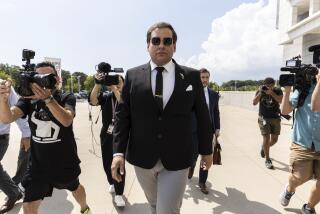Ted Stevens’ case, today
- Share via
Colleagues of the late Sen. Ted Stevens are calling for the heads of six federal prosecutors who concealed evidence from the Alaska Republican’s lawyers at his 2008 corruption trial. They may not get their wish for a while — Atty. Gen. Eric H. Holder Jr. is awaiting a report by the Justice Department’s Office of Professional Responsibility — but in the meantime, Congress can make it harder for overzealous and negligent government lawyers to subject other defendants to the sort of outrageous ordeal Stevens endured.
Stevens, a legendary master of the congressional appropriations process, was convicted of filing financial disclosure forms that failed to list an eclectic assortment of gifts and services, including a sculpture of a salmon, a $2,700 massage chair and thousands of dollars in home repairs performed by employees of a company headed by a longtime friend. Shortly after his conviction, Stevens narrowly lost his bid for reelection. He died in a plane crash in 2010.
In 2009, citing concerns that prosecutors had failed to provide Stevens’ defense with potentially helpful evidence as required by a 1963 Supreme Court ruling, Holder asked a federal court to dismiss the charges and not proceed with a new trial. A fuller picture of the prosecutors’ lapses emerged last week with the release of a troubling 514-page report from a special counsel appointed by the judge in Stevens’ trial.
The counsel, Henry F. Schuelke III, concluded that the investigation and prosecution of Stevens “were permeated by the systematic concealment of significant exculpatory evidence which would have independently corroborated Sen. Stevens’ defense and his testimony, and seriously damaged the testimony and credibility of the government’s key witness.” For example, the government alleged that repairs to Stevens’ home were worth $250,000, $90,000 more than Stevens said he paid. But prosecutors didn’t disclose that Bill Allen, whose company did the work — and who testified against Stevens — had told the government the work was worth only $80,000.
Sen. Lisa Murkowski, like Stevens an Alaska Republican, has introduced legislation that would require prosecutors to promptly provide to the defense any evidence that “may reasonably appear to be favorable to the defendant” — a stronger formulation than the Supreme Court used. Evidence gathered after the initial disclosure would have to be provided “as soon as is reasonably practicable.” If a court found that the prosecution had failed to disclose evidence, it could postpone proceedings, order a new trial or even dismiss the charges.
Given long-standing complaints about prosecutors withholding evidence, Congress should have enacted such legislation without the goad of the Stevens case. But if it takes violations of the rights of a senator to produce action, so be it.
More to Read
A cure for the common opinion
Get thought-provoking perspectives with our weekly newsletter.
You may occasionally receive promotional content from the Los Angeles Times.






